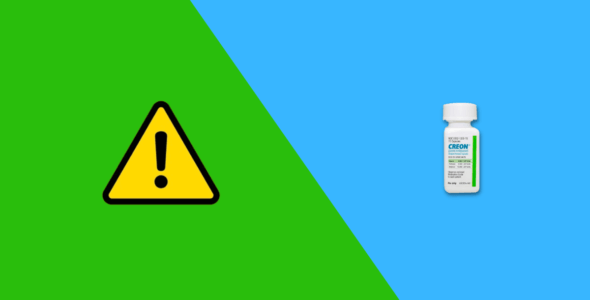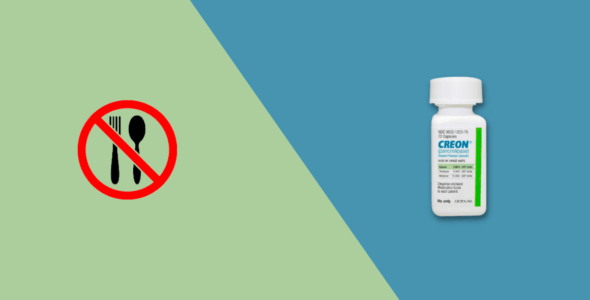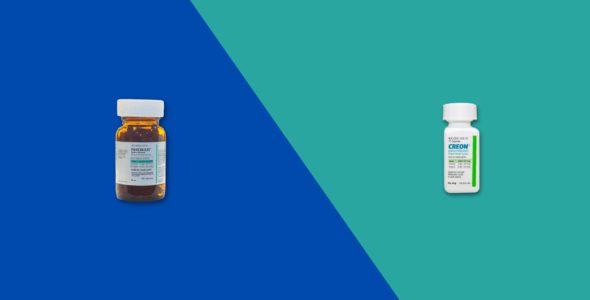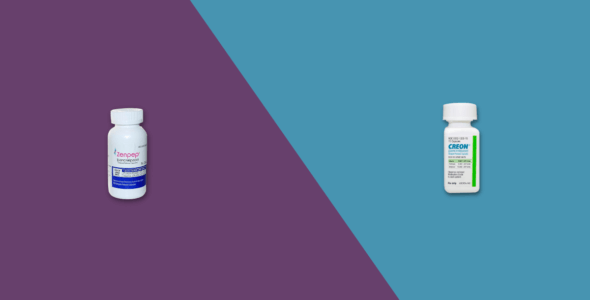Creon alternatives: which other EPI medications can I take?
Table of contents
Creon is an FDA-approved brand-name medication manufactured by Abbott Laboratories. It is classified as a pancreatic enzyme replacement therapy (PERT) and is used to help digest food by breaking down fats, starches, and proteins in your food.
Creon is an expensive brand-name medication with several alternatives available, including medications with lower-cost generic alternatives. Learn more about what Creon is, how it works, its side effects, and its alternatives.
What is Creon?
Creon is a pancreatic enzyme product containing a combination of porcine-derived lipases, proteases, and amylases as active ingredients. It can treat conditions such as cystic fibrosis, chronic pancreatitis, pancreatectomy, and pancreatic cancer, where your pancreas does not produce or release enough enzymes.
Creon releases high levels of lipase, amylase, and protease into the duodenum following activation by its alkaline pH. This facilitates the breakdown of fats into glycerol and free fatty acids, starches into dextrins and sugars, and proteins into amino acids and peptides. The effectiveness of Creon depends on several factors, such as the dose, your gastrointestinal pH, and the microsphere size of the medication.
RELATED: What is Creon
What are the most common side effects of Creon?
The most common possible side effects of Creon include:
- Abdominal pain
- Cramping
- Headache
- Hyperglycemia, or hypoglycemia
- Bloating, flatulence
- Vomiting
- Frequent bowel movements, constipation
- Dizziness
- Cough, sore throat
- Weight loss
Some serious side effects of Creon include:
- Fibrosing colonopathy (scarring of your colon)
- Worsening of a long-term pancreas problem
- Increase in uric acid levels
- Viral infection
- Allergic reactions (hives, face swelling, throat tightness, trouble breathing)
If you experience any of these serious side effects, stop taking Creon and seek medical attention immediately. You are encouraged to report negative side effects of prescription drugs to the FDA. Visit www.fda.gov/medwatch, or call 1-800-FDA-1088.
What are the most commonly prescribed doses of Creon?
- Delayed-Release Capsule – 3,000/units of lipase; 9,500/U of protease; and 15,000/U of amylase
- Delayed-Release Capsules: 6,000/units of lipase; 19,000/U of protease; and 30,000/U of amylase
- Delayed-Release Capsules: 12,000/units of lipase; 38,000/U of protease; and 60,000/U of amylase
- Delayed-Release Capsules: 24,000/units of lipase; 76,000/U of protease; and 120,000/U of amylase
- Delayed-Release Capsules: 36,000/units of lipase; 114,000/U of protease; and 180,000/U of amylase
RELATED: Creon Dosage
How to take Creon
- Take Creon exactly as your healthcare provider tells you. Do not take more Creon capsules in a given day than the number your healthcare provider tells you to take (total daily dose). Your doctor may change your dose based on your body weight or the amount of fatty foods you eat.
- You should not switch Creon with other pancreatic enzyme products without talking to your doctor.
- Take Creon with a snack or meal. If you eat a lot of snacks or meals, make sure you don’t exceed your total daily dose.
- Do not chew or crush Creon capsules or their contents. Do not hold the capsule or its contents in your mouth. This can irritate your mouth or change how Creon works in your body.
- For infants or patients unable to swallow capsules whole, the contents can be sprinkled on soft acidic foods like applesauce at room temperature. The mixture should be swallowed immediately without chewing it. Follow with water or juice to be sure there is no Creon left in the mouth.
- If you miss a dose of Creon, the next dose should be taken with your next snack or meal as directed. Do not double your dose or take extra Creon to make up for the missed dose.
- Read the Instructions for Use and Medication Guide that comes with your Creon prescription.
- Store Creon at room temperature between 59°F to 77°F (15°C to 25°C). You may store Creon between 77°F to 104°F (25°C to 40°C) for up to 30 days. Keep Creon in its original container in a dry place. Keep the bottle tightly closed between uses to protect it from moisture.
How long does Creon last?
The enzymes within Creon should be active for up to one hour. You will need to take another dose of Creon if you eat after more than 1 hour after taking Creon.
What happens if you stop taking Creon?
If you do not take your Creon capsules with each meal, your symptoms may become worse. If you discontinue taking Creon for a long time, you will not have enough pancreatic enzymes to digest the food and absorb the vital nutrients, vitamins (vitamins A, D, E, and K), or the calories available, leading to potential weight loss. This is known as malabsorption.
Foods to avoid when taking Creon
You may need to make changes to your diet when taking Creon. Foods high in fat, protein, and carbohydrates may be difficult to digest and can make your symptoms worse. You should avoid:
- Foods rich in fiber, such as lentils, barley, and brown rice
- Fried food
- Processed meats
- Alcohol
- Large meals – avoid large meals, instead eat 3 to 5 small meals each day
Speak to your healthcare provider or dietitian about which foods you should or shouldn’t eat while using Creon. They will be able to help you create a healthy balanced diet plan that meets your dietary needs.
RELATED: What foods to avoid when taking Creon
Creon alternatives
What are the best pancreatic enzymes to take?
Creon is a pancreatic enzyme supplement containing a combination of lipase, amylase, and protease. There are other pancreatic enzyme products that your healthcare professional can prescribe if Creon is not the right medication for you. The U.S. Food and Drug Administration has approved the following pancreatic enzyme supplements:
- Pancreaze (pancrelipase)
- Viokase (pancrelipase)
- Ultresa (pancrelipase)
- Zenpep (pancrelipase)
- Pertzye (pancrelipase)
Are Creon and Zenpep the same?
Zenpep, in comparison to Creon, is similar in terms of its effectiveness and safety for the treatment of adults and adolescents with cystic fibrosis-associated exocrine pancreatic insufficiency.
Zenpep contains a mixture of digestive enzymes (including proteases, lipases, and amylases) obtained from pig pancreases. It is used to help those patients with exocrine pancreatic insufficiency digest food and the fats, proteins, and sugars in the food.
Natural substitutes for Creon
Natural substitutes to Creon therapy for exocrine pancreatic insufficiency involve maintaining a healthy diet. As discussed previously, there are certain foods you should avoid. You should also make sure you drink plenty of fluids, eat small, healthy meals more often, use dietary supplements, avoid a high-fiber diet, and avoid drinking alcohol.
Why is Creon so expensive?
Creon is a brand-name medication currently not available in a generic form. Branded medications generally are more expensive, mostly due to the manufacturers who have researched, developed, and produced the drug re-couping their costs.
Is there a generic for Creon?
Creon is only available as a brand-name medication and is not currently available in a generic version. (A generic version or generic drug is a copy of the brand-name medication that contains the same active ingredient as the brand-name medication).
Cheaper alternatives to Creon
Cheaper branded alternatives are available to Creon. These include Viokace, which is around half the price to that of Creon, and Pancreaze and Pertzye, which are around 80 % cheaper than Creon. Exactly how much you pay for your medication will depend on where you buy it from and the quantity you buy.
Over-the-counter Creon vegetarian alternatives
Over-the-counter enzyme products from plant sources are available. Hi-Vegi-Lip is a vegetable-based product that is claimed to contain digestive enzymes.
It is important to understand that over-the-counter natural alternatives do not follow the same standards and guidelines required by the FDA for prescription drugs. These over-the-counter products may not necessarily contain the active ingredients or treat the condition they claim to. Always speak to your healthcare provider for medical advice before starting any treatments for a medical condition.
Medically reviewed
A medical professional has reviewed this article.


Jamie Winn, PharmD
Jamie Winn, PharmD
Dr. Jamie Winn received his Doctor of Pharmacy in 2002 from the University of South Carolina College of Pharmacy, Columbia, SC. Jamie is a medical reviewer for NiceRx.





